Richmond KSA gives campus bathrooms a failing grade
November 13, 2009 by Justin Langille · 1 Comment
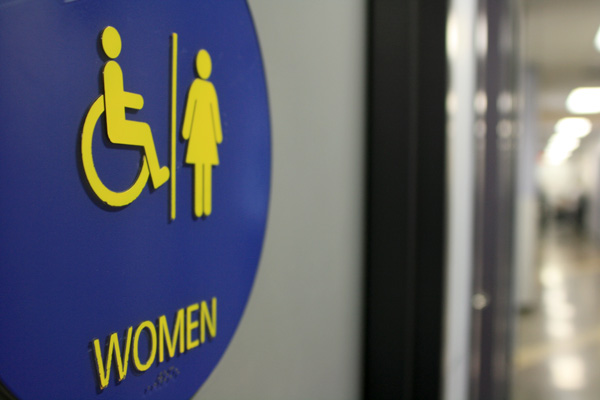
Richmond Kwantlen Student Association council director Reena Bali wants to know who hasn’t been pulling their weight in the washrooms around Kwantlen’s Richmond campus.
In Bali’s Nov.3 council report, buried beneath plans for pool tournaments and club nights, is a frank statement, condemning the conditions of most washrooms on the Richmond campus as “just horrible!â€
Many of the washrooms, especially one for women located near the Blossoming Lotus yoga studio around the corner from the KSA Richmond campus offices, is often found in an unclean state, said Bali.
She isn’t that isn’t sure about the state of washrooms for male students.
Bali said that she thinks what she says are unsanitary conditions shouldn’t be blamed on campus cleaning staff, but on inept students.
“It’s, like, the people who use it,†Bali said. “I guess they don’t know how to use a washroom properly.â€
The state of the washrooms is problem that Bali has noticed since January.
“If someone is using a washroom, they should practice proper hygiene,†said Bali. “Cleaning staff can’t come to the washroom after every 10 minutes, because they have all other things to do, too.â€
Bali feels that, other than the washrooms, Richmond is a pretty clean campus. She plans to talk to KSA chairperson Steve Lee and the university to see if she can solve the problem.
Kwantlen’s janitorial services are contracted out to Dynamic Facility Services Ltd, according to a July 22 bid aware notice written by Christine Monroe, manager of supply contracts for Kwantlen’s supply and business services division, and published on Kwantlen’s website.
Dynamic’s bid for the annual day porter and core cleaning services contract is valued at $473,024 and was accepted on the basis of a best-value criteria.
Sam Mann, facilities supervisor at Kwantlen’s Richmond campus, said that the conditions of washrooms varies from campus to campus, and that poor conditions are often due to vandalism.
“Most kids do respect the facility I believe, but it’s just that the odd person tends to (vandalize),†Mann said.
“I guess some people… could be having a bad day…could be frustrated…some people, I guess it’s just their nature to do that kind of stuff.
KSA v. CFS-BC won’t be resolved until January
November 2, 2009 by Sarah Jackson · 2 Comments
Kwantlen students will be waiting over two more months for CFS representation.
The KSA v. CFS-BC court petition, which will decide whether Kwantlen’s elected ex-officio representative for the CFS-BC can join the executive committee, after the CFS-BC refused to ratify his nomination, has been bumped until January for administrative reasons.
The KSA has decided not to nominate another student to the CFS-BC executive committee.
The B.C. Supreme Court will resolve the issue in January on a date that is yet to be decided, while Kwantlen students, who voted to remain members of the CFS in 2008, continue to funnel $150,000 per year into the organization without receiving representation.
For details on the lawsuit, see our original article.
KSA may not need H1N1 vaccine in student health plan
November 1, 2009 by Jacob Zinn · Leave a Comment
The Kwantlen Student Association likely won’t have to cover the cost of the H1N1 vaccine for students under its health and dental plan.
The student association originally wanted to include the vaccine in the health plan and subsidize some or all of the cost, but the federal, provincial and territorial governments might pay for vaccinations for students.
“At this stage, it looks like they may be offered for free by the province,†said Desmond Rodenbour, general manger of the KSA. “However, if there is a charge, we’re going to make sure they’re covered under the health and dental plan.â€
The Public Health Agency of Canada has said the federal government will cover 60 per cent of the cost, leaving provincial and territorial governments to cover the difference if they choose.
Although the university provides seasonal flu shots, they will not have H1N1 vaccines on campus, according to Janine Hadfield of the Kwantlen Wellness Centre.
“It’s going to be totally regulated by Public Health,†said Hadfield. “The roll-out starts with [people with] chronic illness and pregnant women, then it goes to young under six and further down the road it’s for the everyday person.â€
Hadfield noted that health regions in the Lower Mainland may distribute the vaccine differently.
Currently, the vaccine is only available to specific groups, such as pregnant women and adults under 65 with chronic illnesses.
Vancouver Coastal Health and Fraser Health is planning to make the H1N1 shot available to everyone in mid-November.
KSA collecting students’ thoughts on U-Pass
October 29, 2009 by Kyle Vinoly · 5 Comments
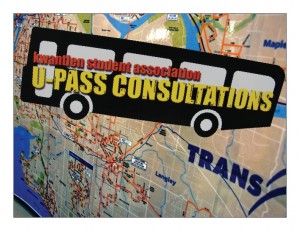
This week a series of U-Pass consultations wrapped up on the Richmond campus. The KSA will return to Richmond next week for another round, eventually concluding in Cloverdale and Langley. (Kyle Vinoy photo)
The Kwantlen Student Association has been touring Kwantlen campuses hosting U-Pass consultations designed to give the KSA a better idea of improvements students would like to see made to transit in order to ease their commute, and to gauge the level of support for a U-Pass.
“We want to make sure that commuting between campuses isn’t the reason students don’t take a course,” said Derek Robertson, director of external affairs.
This week’s series wrapped up yesterday at the Richmond campus, with a return scheduled for next Tuesday afternoon at 2:15 pm in room 1420. Consultations has concluded at the Surrey and Langley campuses, with consultations at Cloverdale scheduled for next week.
At each sessions students are given an 11-page survey which explores their current transit use and improvements they’d like to see Translink make to its service. Robertson said that improving the current level of transit availability and frequency for the Cloverdale and Langley campuses is crucial to the KSA accepting any form of the U-Pass. He also wants to see more recognition payed to Kwantlen by renaming the Landsdowe station on the Canada Line to include the school’s name.
Robertson does not support a $25 U-Pass being pushed by OnePassNow as he feels supporting it would mean Kwantlen students would subsidize students at other colleges, such as Emily Carr and VCC-Clark. He said that those two schools combined have roughly 10,000 students and Kwantlen has 15,000 and that difference would equal an unfair price tag for Kwantlen students. He said that Kwantlen students could hope for a pass costing between $25 to $30 without partnering with other universities.
After all the data from the consultations is complied, Robertson plans to meet with Translink and the provincial government and come to an agreement. He will be in Ottawa next month to present the data and hopes to arrange a meeting with federal transport minister John Baird.
Robertson’s goal is to hold a referendum on the U-Pass in the KSA general election this spring.
Liaison quits KSA over social justice spending decision
October 20, 2009 by Mitch Thompson · 4 Comments
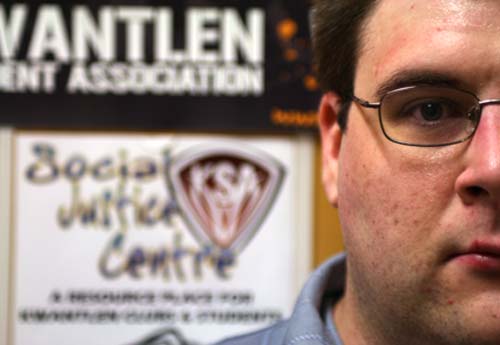
Ken McIntyre has resigned as a student liaison after a KSA decision over an referendum-approved charge for a Social Justice fund. (Mitch Thompson photo)
Student liaison Ken McIntyre has resigned from his position on the Kwantlen Student Association council to protest the handling of a referendum-approved 10-cents-a-credit fee to fund the Social Justice Centre.
McIntyre, who had been the liaison to the KSA for students with disabilities, one of seven positions that focus on social justice issues at the university, resigned Oct. 6 after the KSA voted to remove the 10-cent-a-credit fee from Social Justice and increase the KSA’s building fee from 25 cents a credit to 35 cents.
The social justice fee was approved in the September referendum and would have been used to fund the liaisons and their Social Justice Centre, rather than having their budget come from KSA operating funds.
Derek Robertson, director of external affairs, made the motion to remove the Social Justice fee and increase the student union building fee instead.
“His rationale was that we still had a budget for the previous year, even though it was taken out of the KSA operating expenses,†said McIntyre.
Because of the KSA’s self-imposed student-fee-increase limit of 15 per cent (or $1.56 for next year) a year, the KSA council would be unable to introduce the social justice fee as well as raise the building fee.
McIntyre fears that removing the fee would mean there is no guarantee that social justice will receive adequate funding next year.
“Any other proposal that was put forward by myself or somebody else was, basically, swiftly voted down by [Robertson] and the council,†he said.
The motion was passed and McIntyre decided to leave the KSA in protest. “[Social justice is] more or less one of their bottom issues that they pay lip service to,†he said.
A representative for the KSA said priorizing played an important role in the choosing of which of the fees approved by students would be implemented.
“When we put these questions forward, we didn’t think they would all pass,†said Nathan Griffiths, director of operations.
All of the fees, save one CFS-related one, were passed, and the KSA was faced with the problem of deciding who receives money first while staying under the 15 per cent cap on student fee increases.
“Largely, more people voted for the student union building than people voted for social justice,†Griffiths said.
The referendum results released by the KSA show 58.5 per cent of voters were in favour of the student union building fee and 52.6 per cent of voters were in favour of the social justice fee.
One of the considerations for the KSA is the large mortgage on Surrey campus’s G-building.
The building — which currently houses the KSA, the gymnasium and Grassroots café, other facilities and classroomsz — was built in the 1990s. The provincial government had refused to pay for anything that wasn’t a classroom, so the KSA held a referendum and raised the $1.8 million dollars needed for the other rooms.
The KSA has been paying a sizable mortgage since, and needs to pay it off before it can begin constructing a new student union building.
“We’ve got to pay the mortgage,†said Griffiths. “I don’t think we’d look bad for paying the mortgage.â€
Robertson echoed Griffiths’ position, saying that he felt it would be better to pay off the mortgage more quickly, rather than having the 10 cents a credit go to social justice.
“This was not an attack on our liaisons. This was not an attack on social justice at Kwantlen,†he said. “The whole argument that the KSA is underfunding liaisons is just not true.â€
Robertson said that the KSA provides funding for social justice but sees little of that money being used. “Every single year, the KSA puts money towards the Social Justice Centre and liaisons, and every single year a majority of it is not spent,†he said.
For Griffiths, this is enough to make him reconsider sending more money to social justice. “More money doesn’t necessarily equal more social justice,†he said.
McIntyre explained the lack of spending is a result of the culture towards social justice within the student association. He said that the unused funds come from vacant liaison positions or are the result of provisions that state only a certain percentage of money can be spent at one time.
He also said that many liaisons don’t focus on large scale, high-expense events, as “the amount of money that’s available, with the lack of cooperation and manpower from the rest of the society, sometimes doesn’t make it worth doing.â€
According to McIntyre, indifference towards social justice extends past a lack of funding and into where the liaisons actually work.
The possibility of turning the Social Justice Centre into extra office space for KSA staff, and instead issuing liaisons low-end laptops on which to work, has been discussed among members. The belief was that since the liaisons are multi-campus positions, making their workplace mobile was a natural step.
McIntyre countered however, saying that the KSA executive are technically multi-campus positions as well, but receive both office space and laptops.
“It’s adding insult to injury, as far as I’m concerned,†he said.
“I still believe that the student association is good for the students at Kwantlen,†said McIntyre. “As far as social justice issues, I have lost faith in the student association to make any headway.â€
Robertson said that he will fight to make sure social justice gets the same funding as last year, but McIntyre wasn’t impressed.
“Guaranteeing funding for the amount of money we got last year is a good first step,†he said. “But, at the same time, if you take a look at other students unions, and what they have for social justice, it’s going to take more than just an empty promise.â€
KSA terms referendum results ‘historic’
October 20, 2009 by Sarah Jackson · 1 Comment
Twelve of the 13 items on this September’s referendum ballot were approved, a result that the Kwantlen Student Association, who planned the referendum, never foresaw.
Student fees will increase $1.56 per credit for the spring, summer and fall 2010 semesters to fund the creation of student union buildings, the START volunteer program, the REBOOT computer service, intramurals and clubs and events. This means that full-time students registering for 15 credits should expect their spring semester bill to be $23.40 higher.
The KSA plans to begin START, REBOOT and intramural programs in January and is discussing holding a referendum asking students for permission to raise student fees more than 15 per cent per year to hasten the introduction of other items that were approved.
“This is quite historic,†said Steven Lee, director of finance for the KSA. “The KSA wasn’t expecting all of [the referendum items] to pass. We wanted to see what students wanted us to do, so it was kind of a referendum slash opinion poll.â€
Fees collected for the student union fund will be put toward building planning and paying off the $1.6 million G-building mortgage from the 1990s, which was partially covered through the KSA’s reserve funds last year. The clubs and events fee will be used to offset current clubs and events spending, which totaled over $150,000 last year.
Less than half of one per cent of Kwantlen students voted: 494 ballots were cast, surpassing the 250-minimum required to make referendum results binding.
The turnout was “quite good for a referendum,†said Lee.
The Canadian Federation of Students fee increase, the only item that failed, will not affect Kwantlen’s CFS membership. The proposed increase was questioned by Shamus Reid, chairperson of the CFS-BC, as an amount he was not familiar with and something that would not normally appear on a referendum ballot.
“I don’t know where that number came from,†he said.
Desmond Rodenbour, general manager of the KSA, said that the CFS adjusts membership fees for inflation every year and that the KSA reached the $1.78 fee increase by calculating the CFS’ percentage increase.
After consulting the University Act and the College and Institute Act, the KSA determined that it has “no legal authority to increase student fees without a referendum,†said Rodenbour.
Lee believes the item failed because “the students that voted are already familiar with the KSA, so they know how the CFS has been treating the KSA.†Everything else passed because “we were able to get different people [campaigning] that were interested in different areas.â€
Familiar feud lies within student fee referendum
September 22, 2009 by Mitch Thompson · 1 Comment
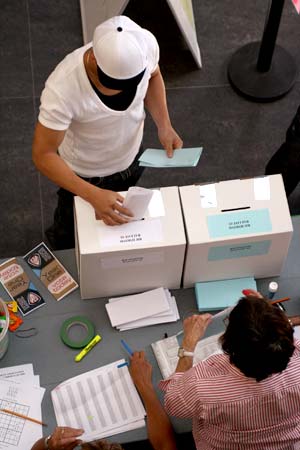
A Kwantlen student submits his referendum ballots. Volunteers were on hand to direct students towards the voting area. (Mitch Thompson photo)
Old issues between the Kwantlen Student Association and the Canadian Federation of Students have been brought back to the forefront in this week’s fee referendum.
The referendum, which runs from Sept. 21 to 24, concerns a number of proposed new fees to be paid each semester.
The KSA is supporting most of them, writing in its pamphlets, “This is your chance to build Kwantlen’s future.â€
Some of the fees are aimed at improving existing services offered by the association, such as a 65-cent-a-credit fee to provide funds for student clubs and KSA-hosted events.
Other programs suggested are 13 cents a credit for the creation of a volunteer-run online radio, Radio Free Kwantlen and a $2.50 fee per credit to aid in the creation of new student union spaces.
“We want to help the university make the transition from a university-college, to a university,†said Richmond campus director for the KSA, Reena Bali.
“A lot of the questions that are proposed, we don’t have the funding to do it without increasing the fees.â€
But the KSA is certain that these programs would be worth the added cost.
“The event [proposal] is really good because it gives us a chance to work with the school, and throw correlated events,†said Bali. “If students come in and say, ‘We want this type of event,’ we have the funding to do so.â€
Bali also supports the Students Taking an Active Role Together, or START, program, which offers volunteer opportunities to students, as well as free or discounted job-related training, such as first aid or Food Safe.
However, one question on the referendum, question 11, doesn’t deal with new programs, but rather an increase in the membership fee to belong to the Canadian Federation of Students.
The $1.78 increase doesn’t sit well with the KSA, which says that it has been directed to up the cost by the CFS’s “three separate legal entities.â€
The issue is over why the increase is needed, and what it will be used for.
“I’ve gone to two CFS meetings and they’ve never discussed it publicly in the meetings. When you do try to question them in budget, they do not answer your questions, or they say you do not have speaking rights,†said Bali.
Instead of approving the increase without student consultation, the KSA has decided to put it to vote.
“We believe students should decide whether it’s worth it to pay the Canadian Federation of Students more money than we do already,†said Bali.
Dave Molenhuis, the treasurer for the CFS, has a few criticisms of the referendum question.
“In the past, students at Kwantlen voted and have voted since on continued membership to belong to the Canadian Federation of Students, and at that time voted on the basis that there would be a membership fee,†he said.
The membership fee is set at a national general meeting of all CFS members, including the KSA.
“The premise of the question that’s being asked is that the CFS has directed the KSA to do ‘X,’ when in fact the student unions resolved to do this at a federation meeting.â€
The 2009/2010 fee is $3.99 for CFS membership and services, as well as a $3.99 fee at the provincial level. This is then adjusted for inflation using the Canadian consumer price index.
Molenhuis said that this year’s fee is equal to last year’s, and the adjustment for inflation doesn’t equal $1.78.
He doesn’t see where the KSA’s increase is coming from.
As to the stonewalling of KSA delegates looking for information on what the fees are used for, Molehuis is also skeptical.
“I haven’t been asked by the director at the Richmond campus for any information. All the documents, by-laws, constitutions, are housed in the offices of the student associations,†he said.
He also explained how the money is used.
“The fees are spent on anything from campaigns to the preparation and production of research, to travel for students to participate in lobbying sessions,†he said.
The animosity between the two organizations is not new. In 2008, the KSA held a referendum asking students if they wanted to leave the CFS: 56 per cent of Kwantlen students voted to stay.
These referendum questions could be foreshadowing another showdown.
“Last time it was pretty close,†said Bali. “We do have a petition asking students if they want to defederate.â€
Regardless of association politics, Bali and the KSA hope that Kwantlen students take the time to cast their ballot.
“I would hope that all students would vote. The only way we can operate properly as a society is to come out and vote,†said Bali.
Most interesting student contest promotes beer sales
September 21, 2009 by Jacob Zinn · Leave a Comment
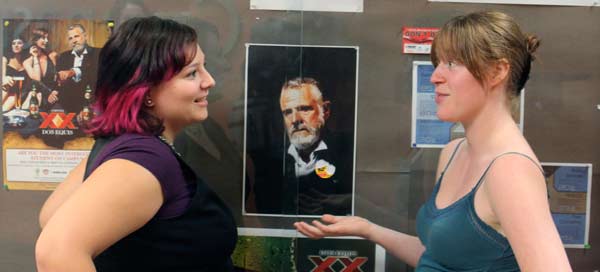
KSA members Vanessa Knight and Catherine Wilkinson discuss the Most Interesting Man in the World at the Surrey campus on Thursday. (Jacob Zinn photo)
The Kwantlen Student Association in Surrey is getting closer to finding the most interesting student on campus.
The KSA, in partnership with Dos Equis, Travel Cuts and Contiki Holidays, is giving away a trip to London, England to the most interesting student on campus.
The contest is a take on Dos Equis’ series of Most Interesting Man in the World ads, which feature a daring, sophisticated older gentleman with a taste for Dos Equis.
“The Dos Equis commercials have been very successful,†said KSA commercial services manager Catherine Wilkinson. The KSA is taking advantage of the ads’ popularity to promote not only student involvement, but also the sale of alcohol at the Grassroots Cafe at the Surrey campus.
Five finalists have been randomly selected from earlier contest entries. They have until the end of the month to campaign for votes and convince students that they are more interesting than their four competitors.
Students can vote for their favourite finalist by buying Dos Equis beer at the Grassroots Cafe and filling out a ballot that comes with their beverage. Whoever receives the most votes wins the trip, which includes two nights accommodation, a $400 voucher on flights with Air Transat, a bus sightseeing tour, tickets to a London theatre show and discount cards for attractions.
“In addition to all of that, people will get to know that the Grassroots Cafe is a place that you can actually buy alcohol,†said Wilkinson.
The contest is only held on the Surrey campus because it’s the only one that sells beer. Wilkinson said the KSA is working on more events with alcohol at other campuses.
Cloverdale students support fitness centre for their campus
March 19, 2009 by Nick Major · 1 Comment
There is solid student support for a proposed fitness centre at the Cloverdale campus, but a final decision by Kwantlen administration probably won’t come anytime soon.
According to the results of a petition drive in September and October, Cloverdale students were overwhelmingly in favour of a fitness centre for their campus, which would be placed in a currently under-used facilities room roughly the size of the Surrey campus gym.
The KSA has had meetings with Kwantlen administration, which were described as positive by KSA External Affairs Director Derek Robertson.
Although the KSA would ideally like to see gyms on all four campuses, Cloverdale was considered for the fitness centre for a number of reasons, according to John O’Brian of the Cloverdale KSA. Cloverdale is primarily a trades campus, and the physical nature of most skilled trades also require students to be physically fit.
The Cloverdale campus also already has enough potential space, unlike Richmond and Langley, the other two campuses lacking a fitness centre. Richmond has “zero space” for expansion, according to O’Brian, while Langley has relatively few students and is currently undergoing a revitalization of its campus.
The KSA is waiting until that is finished before deciding on a fitness centre there.
Although students are strongly behind the proposed fitness centre, talks are continuing with the higher levels of administration. Robertson declined to predict when it might become a reality. “By giving a time frame, it would be complete speculation,” he said.
Music, dance … and raising funds
March 4, 2009 by mark · Leave a Comment
Reporters Sandy Buemann and Zoe Tarlow turn their cameras and audio recorders on Dessi Fusion, a special event, sponsored in part by the KSA, that combined music, dance and fund-raising for the B.C. Children’s Hospital.


